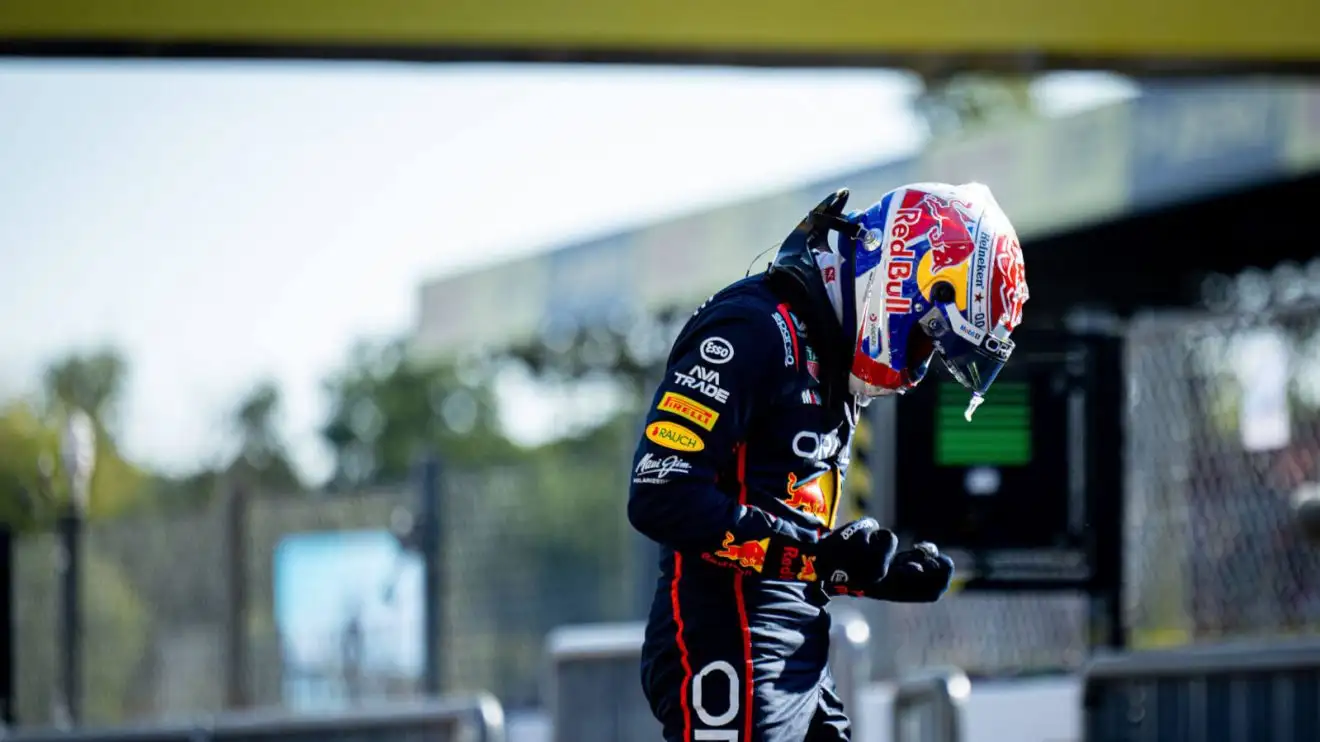Uncovered: The McLaren policy adopted by Red Bull that led to Verstappen’s Italian GP win

Max Verstappen celebrates at Monza
Having spent years under Christian Horner’s leadership turning the engines down on a Friday, Christijan Albers believes new team principal Laurent Mekies’ call to tackle practice head-on led to Max Verstappen’s Italian Grand Prix victory.
It’s a philosophy used by McLaren to great success, with the Woking team on course for the championship double.
Red Bull’s new Friday philosophy paid off at Monza
Although Red Bull won three Drivers’ titles with Verstappen and two Constructors’ in the ground-effect aerodynamic era, the team’s form has suffered over the last 18 months while McLaren has come to the fore.
Facing questions about Verstappen’s Formula 1 future as well as its first defeat in the Drivers’ standings since 2020, Red Bull parted ways with long-serving team principal Horner after the British Grand Prix.
Marko revealed: “This was the result of various factors, but above all, the performance wasn’t quite as good as it could have been.”
Racing Bulls’ Laurent Mekies stepped up to Red Bull in his stead and according to Marko, implemented one big change – Fridays.
Instead of just putting in the miles on Fridays, under Mekies’ leadership Red Bull tackled the practice sessions with a more competitive mindset.
“It’s mainly a different approach to practice. We’re trying things out and already pushing closer to the limit during practice,” the Austrian explained to Sky Germany.
“That allows us to find the car’s maximum earlier and ensures we’re not as far off in set-up direction compared to the past.”
It’s an approach that Albers believed paid off at Monza where Verstappen grabbed pole position before going on to secure his third grand prix win of this season.
F1 2025: The season’s winners and losers
👉 The results of the F1 2025 championship
👉 The updated Drivers’ and Constructors’ Championship standings
A guest pundit on De Telegraaf’s Formula 1 podcast, podcast host Erik van Haren highlighted how Red Bull had turned the engines up on the RB21s during Friday’s running.
“They do that,” he said, “because then they can estimate much better what will happen on Saturday. That sounds very logical, but we all know that Red Bull hasn’t done that for a very long time.”
Albers reckons that was a Horner approach to the weekend, one that wasn’t necessarily wrong but that did create other problems further into the weekend.
“I think Laurent’s influence is already reflected in this,” the former F1 driver said.
“Everyone was stuck for this [during the Horner years]. This was their way of thinking, and this is how it was carried out on Friday.”
Albers, though, says he understood the logic behind turning the engines down on a Friday to preserve them.
“In the first place, you want to give the engine as little as possible its flicker. You want to keep it as fresh and strong as possible and the more you ride it, the more the power decreases.
“So that’s very important.”
But while it made sense in theory, the former F1 driver believes it opened the door to other issues come Saturday’s running.
“In theory, for example, you could go three-tenths faster on Saturday, but in practice it is sometimes different,” he said.
“Even the best driver has to get used to a new situation. If you suddenly come five kilometres per hour faster at the chicane, you have to adapt.”
He went on to claim that not sandbagging on a Friday has stood championship leaders McLaren in good stead.
“They go full throttle all weekend and McLaren has done that. We saw that in Zandvoort. They go to the limit much faster and then fine-tune,” he revealed.
Verstappen won the Italian Grand Prix by 19.2s ahead of Lando Norris to move 36 points clear of George Russell in the race to join the McLaren teammates on the F1 2025 season’s podium.
Red Bull motorsport advisor Helmut Marko believes Mekies deserves a lot of the credit for the Monza win.
“The difference is that the preparation is a different one,” he told PlanetF1.com’s Thomas Maher and other publications.
“Laurent is an excellent engineer. So it’s more based on data than whatever the simulation is showing you.
“But mix it with the experience like Max has, or the experience our racing engineers have, make a car which is predictable and drivable, that’s the product.
“Basically, it’s the same. Okay, some updates were coming and they were working, but 20 seconds on McLaren, I wouldn’t have predicted that.”
Read next: Toto Wolff reveals tough love comment to Lewis Hamilton after ‘useless’ outburst





